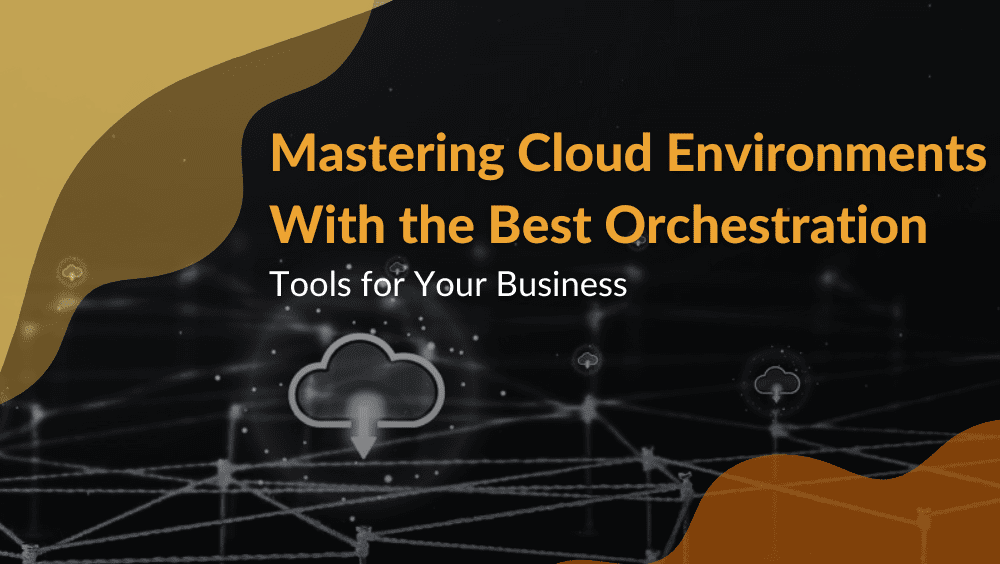With the advent of technology today, you can expect the majority of companies to adopt cloud technologies. However, that’s not to say that managing multiple cloud services, infrastructure, and applications isn’t complex.
This is where cloud orchestration tools come into play. It is crucial to automate workflows, task coordination, and resource management to help simplify the operation of cloud environments.
First things first — what is Cloud Orchestration?
Cloud orchestration is all about the automated coordination and management of cloud services. The way it integrates various processes across cloud platforms makes everything easier. It increases the efficiency of businesses through streamlined operations and optimized use of resources.
Businesses would be able to manage individual cloud services manually by offering centralized control over complex environments. Whether using public, private, or hybrid cloud infrastructures, orchestration ensures that tasks such as provisioning servers, setting up networks, and managing storage resources are automated and synchronized.
Key Features of Cloud Orchestration
- Automation of deployment tasks and workflows
- Scalability of services based on demand
- Centralized management across cloud environments
- Integration of services from different cloud providers
- Enhanced security and compliance automation
Benefits of Cloud Orchestration
Organizations managing large, multi-cloud environments would benefit from cloud orchestration in more ways than one.
Increased Efficiency: Repetitive tasks shouldn’t take your time too much. With cloud orchestration, you’d be able to automate things such as deploying applications, provisioning resources, and managing infrastructure. How does it help your business? It reduces human error, allowing for a greater focus on more strategic tasks.
Cost Optimization: Businesses get to pay only for what they use with orchestration. In addition, it would ensure that resources are allocated efficiently.
Enhanced Security: It’s good that cloud orchestration tools often come with built-in security features. This ensures that policies, compliance rules, and encryption protocols are applied consistently across the entire cloud environment. Not to mention, the enhanced security helps organizations meet regulatory requirements and safeguard sensitive data.
Simplified Management: Managing multiple cloud platforms can be complicated. It’s good then that cloud orchestration can simplify things through a unified management interface. Say goodbye to manual configurations, and hello to minimal operational complexity.
Quicker Scalability: Scaling services dynamically without the need for too much manual intervention in response to demand is possible with automation.

Best Cloud Orchestration Tools Used by Industries
There are different tools available, each catering to different business needs. If you are wondering, here are some of the most popular tools used by industries to optimize cloud management:
1. Kubernetes: This is your choice if you need a platform that automates scaling, deployment, and management of containerized applications. It is widely used due to its flexibility, scalability, and strong community support.
2. Apache Mesos: When you have a powerful orchestration tool that supports the management of resources across distributed systems, that saves you a lot of time. Apache Mesos excels in running large-scale applications and is widely used in industries such as IT and telecommunications.
3. OpenStack Heat: This one provides orchestration for OpenStack-based clouds. There are templates available to automate the creation of cloud infrastructure resources. It includes servers, storage, and networks.
4. AWS CloudFormation: This is Amazon Web Services’ orchestration tool that allows users to model and set up AWS resources using simple text files.
5. Google Cloud Deployment Manager: Users looking to automate and manage Google Cloud Platform (GCP) resources will surely benefit from Google Cloud Deployment Manager. It uses configuration files written in YAML or Python, making it easy to deploy and manage applications on GCP.
6. Microsoft Azure Automation: This is a popular choice among businesses using Azure. It facilitates the integration with third-party services. Not to mention, it also supports multi-cloud environments.
7. Terraform: The famous tool allows infrastructure as code (IaC) management across multiple cloud platforms. It integrates well with AWS, GCP, Azure, and more, offering flexibility to organizations working with multi-cloud architectures.
8. Rancher: This specific option provides tools for managing multiple Kubernetes clusters, making it an excellent choice for organizations that rely heavily on containerized applications.
9. SaltStack: You can count on this tool if you are looking for powerful orchestration capabilities. SaltStack helps manage cloud infrastructure and also automates such complex workflows. It is highly scalable and can be used to automate both public and private cloud environments.
10. VMware vRealize Automation: Organizations, administrators, and programmers in need of automated delivery and management of IT services across cloud environments will love this. It supports hybrid cloud orchestration, making it a preferred choice for businesses using both private and public clouds.

Different Categories of Cloud Orchestration Tools
Just as there are different tools used by industries, tools can also be classified based on the environment they support. The organizations also need to take into account what the tools are designed to automate.
Here’s what you need to know:
1. Infrastructure Orchestration
From the term itself, infrastructure orchestration covers everything including networks, storage, and computing resources as well as cloud migration. Examples include AWS CloudFormation and Terraform.
2. Application Orchestration
Managing the application’s lifecycle across various cloud platforms is a need to have a more resilient and efficient system. A notable example is Kubernetes, which is extensively used to manage containerized applications.
3. Hybrid Cloud Orchestration
With this orchestration, businesses can facilitate smooth integration between different cloud providers. VMware vRealize Automation is a good (and common) choice.
4. Security Orchestration
Improving incident response is possible through security orchestration. This integrates and automates various security protocols, including risk management. These tools maintain consistent security practices across cloud platforms, offering centralized oversight of security measures.
Cloud orchestration tools are taking the spotlight
Cloud orchestration tools have become indispensable for modern organizations, especially those working with multi-cloud environments. These tools offer a lot of benefits from simplifying cloud management to strengthening overall security.
Whether it’s infrastructure management or hybrid cloud integration, there is something for every business’ needs.
KamelBPO has a team that can help you choose the right cloud orchestration tool. Let the team know your specific cloud architecture, and wait for experts to work on it. Whether it’s focused on containers, hybrid clouds, or scaling large infrastructures, you have an expert team ready at your disposal.
If you need a solution for your business, let us help you find the right orchestration tool.

